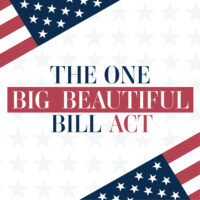
The U.S. Treasury Department, in coordination with the IRS released the preliminary list of occupations eligible for the no tax on tips provision under HR 1, PL 119-21, commonly known as the One Big Beautiful Bill Act (OBBBA).
What is the Tip Exclusion?
Under the One Big Beautiful Bill Act (OBBBA), eligible workers may exclude up to $25,000 in tips per year from federal income tax starting in 2025.
To qualify:
- The occupation must customarily and regularly receive tips.
- The tipping activity must have occurred on or before December 31, 2024.
- Tips received in excluded fields—such as healthcare, performing arts, and athletics—do not qualify.
Note: This exclusion applies to both employees and self-employed individuals in qualifying occupations.
Preliminary List of Eligible Occupations
The Treasury’s list includes 68 occupations, organized by sector and identified by Standard Occupational Classification (SOC) codes. Below is the preliminary list of some of the listed occupations:
Beverage & Food Service
- Bartenders (SOC 35-3011)
- Wait Staff (SOC 35-3031)
- Nonrestaurant Food Servers (SOC 35-3041)
- Chefs and Cooks (SOC 35-1011 to 35-2019)
- Fast Food and Counter Workers (SOC 35-3023)
- Dishwashers, Hosts, Bakers
Entertainment & Events
- Dancers (SOC 27-2031)
- Musicians and Singers (SOC 27-2042)
- Disc Jockeys (except radio) (SOC 27-2091)
- Digital Content Creators (SOC 27-2099)
- Gambling Dealers and Cage Workers
Hospitality & Guest Services
- Baggage Porters and Bellhops (SOC 39-6011)
- Concierges (SOC 39-6012)
- Hotel Desk Clerks, Maids, Housekeeping Staff
Home Services
- Home Maintenance Workers (SOC 49-9071)
- Electricians, Plumbers, HVAC Technicians
- Home Cleaning Service Workers (SOC 37-2012)
- Roadside Assistance Workers
Personal Services
- Personal Care Aides (SOC 31-1122)
- Private Event Planners (SOC 13-1121)
- Photographers and Videographers
- Pet Caretakers
- Massage Therapists, Barbers, Cosmetologists
Excluded Occupations
The Treasury explicitly excluded from the tip exclusion provision the following:
- Specified service trade or business
- Healthcare (e.g., nurses, dental hygienists)
- Athletics (e.g., professional athletes)
These exclusions are based upon the IRS’s interpretation of what constitutes customary tipping.
Next Steps
The official proposed list is published in the Federal Register. Public comment is invited until October 22, 2025. You will be able to view the public comments and comment before finalization during this period.
IRS Reporting Changes
To implement the tip exclusion, the IRS has introduced new reporting requirements and will implement these changes for tax year 2026.
Form W-2 Updates:
- Box 12: New code “TP” for Total Qualified Tips.
- Box 14b: New field for Treasury Tipped Occupation Code (TTOC).
- Employers must report both the occupation and the qualified tip amount.
Schedule 1-A (Form 1040)
- Employees will use this new schedule to claim the tip deduction.
Employer Responsibilities
- Must file information returns with the IRS or SSA.
- Must provide statements to employees showing:
- Total cash tips received
- Occupation code
To help clients comply, we have created a Tip Tracking Worksheet which is designed for employees eligible under the OBBBA.
Schedule 1-A: A New Form For Additional Deductions
For tax year 2025, the IRS has introduced Schedule 1-A (Form 1040), Additional Deductions, as part of the OBBBA rollout. This form consolidates four new below-the-line deductions into a single schedule, streamlining the process for taxpayers and professionals alike.
Unlike the traditional Schedule 1, which includes a broad range of adjustments to income, Schedule 1-A focuses on deductions that reduce taxable income but do not affect AGI.
- No Tax on Tips Deduction – For qualified tips received by employees or self-employed individuals, subject to MAGI-based phaseouts.
- No Tax on Overtime Deduction – For federally mandated overtime compensation, also subject to MAGI thresholds.
- Car Loan Interest Deduction – For interest paid on qualified passenger vehicle loans, with documentation and VIN reporting requirements.
- Enhanced Deduction for Seniors – A flat deduction for taxpayers (and spouses, if MFJ) born before January 2, 1961, with MAGI-based phaseouts.
These deductions reduce taxable income but don’t affect AGI. They’re reported on line 13b of Form 1040 and are temporary (set to expire after 2028).
Conclusion
Schedule 1-A simplifies how taxpayers claim new deductions. But eligibility rules—like MAGI phaseouts and documentation requirements—can be tricky.
Tax practitioners should review Schedule 1-A and instructions now to avoid surprises during 2025 filings. Stay tuned for updates as the IRS finalizes the form later this year.
By Jill Kenady
Tax Materials Specialist, U of I Tax School

Sources:



